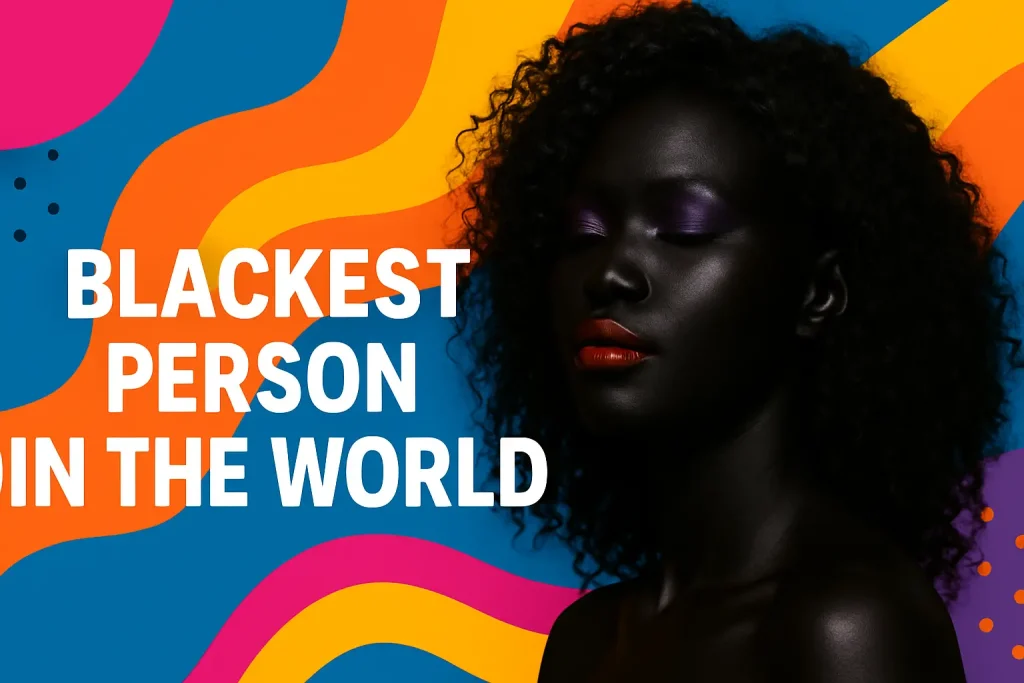
In a world where beauty standards are constantly evolving, a powerful and inspiring conversation has emerged about deep skin tones, melanin pride, and true representation. The phrase “blackest person in the world” has captivated the internet, stirring admiration, debate, and curiosity. But beyond the viral buzz lies a story of empowerment, cultural identity, and the breaking of harmful stereotypes.
This article dives deep into the life of Nyakim Gatwech, often dubbed the “Queen of Dark,” explores the science of melanin, and debunks viral myths. Along the way, we’ll meet other icons like Khoudia Diop and uncover why embracing skin diversity isn’t just a trend — it’s a movement.
Blackest Person in the World: Understanding the Viral Phenomenon
The internet has a unique way of spotlighting individuals, especially those who challenge norms. When images of Nyakim Gatwech began circulating with captions claiming she was the “blackest person in the world,” they went viral. People were mesmerized by her radiant, deep skin tone and bold confidence.
While the term may sound sensational, it sparked essential discussions about what it means to be Black, beautiful, and proud. Rather than labeling, it’s more accurate to celebrate the beauty of melanin-rich individuals without creating a hierarchy of skin tones.
The Rise of Nyakim Gatwech and Her Iconic Presence in the Fashion Industry
Nyakim Gatwech, a South Sudanese-American model, rose to fame through powerful imagery and unapologetic self-love. Her journey began in a world that often upheld lighter complexions as the standard of beauty. Nyakim chose to challenge that narrative — and she did so fearlessly.
Known for her bold presence on Instagram, Nyakim quickly caught the attention of major brands and fashion editors. Her modeling career now represents more than just beauty — it’s a cultural statement. She stands for dark skin pride, self-acceptance, and redefining elegance.
Also Read: https://fizzymag.co.uk/aaren-simpson/
Debunking the Guinness World Record Myth About the Darkest Skin Tone
One persistent rumor claims that Nyakim Gatwech holds a Guinness World Record for having the darkest skin tone ever recorded. This, however, is entirely false. Guinness World Records has confirmed that no such title exists or has ever been awarded.
Buzzfeed, Tuko, and AFP Fact Check have also debunked the claim. The myth may have gained traction due to her stunning photos and captivating nickname, but it’s crucial to separate fact from fiction. Misleading information, while sometimes well-meaning, can detract from the real achievements of these inspiring individuals.
Why Nyakim Gatwech is Called the “Queen of Dark” by Her Followers
Nyakim’s fanbase affectionately calls her the “Queen of Dark.” It’s a title she embraces — not as a gimmick, but as a badge of honor. Her complexion, once the target of bullying, is now a symbol of strength and resilience.
The nickname reflects her leadership in redefining melanin beauty standards. She’s not just a model; she’s a movement. Her influence stretches beyond runways and Instagram feeds, reminding everyone that darkness can radiate with power, grace, and pride.
Exploring Melanin: The Science Behind Dark Skin and Natural Pigmentation
Melanin is the natural pigment responsible for the color of our skin, hair, and eyes. People with higher concentrations of eumelanin — a type of melanin — tend to have deeper skin tones. It’s a marvel of biology and a gift of nature.
The richness of melanin isn’t just skin-deep. It offers some biological advantages like UV protection and slower aging of the skin. Understanding melanin helps combat stereotypes and celebrates the diversity of human beauty.
The Role of Social Media in Spreading Misinformation About Skin Tone Records
Social media platforms like Instagram and TikTok can elevate voices — but they also spread misinformation at lightning speed. Nyakim Gatwech’s story was quickly twisted by clickbait headlines and exaggerated posts.
Many users believed the Guinness World Record myth simply because of an eye-catching caption. This underscores the importance of media literacy. Viral beauty stories should uplift, not mislead. Verifying facts ensures we honor the truth behind the person.
How Colorism Influences Beauty Standards Across Cultures and Industries
Colorism — the discrimination based on skin tone, often favoring lighter skin — has long impacted communities worldwide. In fashion, entertainment, and even daily life, those with darker complexions have often faced prejudice.
Nyakim’s story is a bold rebuttal to that legacy. Her success in an industry historically rooted in colorism sends a clear message: beauty exists in every shade. Her presence challenges outdated norms and empowers others to do the same.
Meet Khoudia Diop: Another Powerful Voice Celebrating Deep Skin Tones
Khoudia Diop, a Senegalese model known as the “Melanin Goddess,” is another prominent figure changing the face of beauty. Like Nyakim, she rose to fame by embracing her dark skin and proudly showcasing it to the world.
Her campaign for acceptance and celebration of skin tone diversity complements Nyakim’s mission. Together, they represent a global shift in how beauty is perceived, encouraging millions to love their natural selves.
Breaking Stereotypes: Representation of Dark Skin in the Global Fashion Scene
For decades, mainstream fashion excluded models with deeper skin tones. Today, thanks to pioneers like Nyakim and Khoudia, representation is finally evolving. These women are not just included — they’re celebrated.
Their success paves the way for future models to enter the industry without compromising their identity. It also inspires brands to embrace authentic diversity, not just tokenism. Representation is no longer a trend — it’s a requirement.
The Importance of Embracing Skin Diversity in Modern Beauty Ideals
Skin diversity is more than an aesthetic preference — it’s a cultural necessity. Celebrating all shades fosters a healthier, more inclusive society where everyone feels seen and valued.
Nyakim Gatwech’s story is a testament to that need. Her presence in beauty campaigns and global fashion weeks invites a rethinking of traditional ideals and promotes a message of radical self-love and inclusivity.
How Nyakim Uses Her Platform to Advocate for Self-Love and Confidence
Beyond modeling, Nyakim is a motivational speaker and activist. She uses her platform to uplift others, especially young Black girls who may feel pressured to conform to lighter beauty ideals.
Her messages are filled with power words: love yourself, be proud, embrace your truth. These words resonate deeply in a world that often tells women of color they need to change. Nyakim reminds them they are already enough.
The Truth About Viral Claims and Why Critical Thinking Matters Online
In today’s digital age, not everything we see online is accurate. Viral claims about the “blackest person in the world” show how quickly misinformation spreads.
Critical thinking — especially in regard to viral beauty stories — helps preserve the integrity of individuals’ achievements. Celebrating someone’s beauty should never come at the cost of truth.
Top Myths About Skin Tone That Need to Be Busted Immediately
Myth 1: Dark skin isn’t beautiful. False — dark skin is radiant, rich, and regal. Myth 2: Lighter is always better. Not true — beauty isn’t a gradient; it’s a spectrum.
Myth 3: There’s a record for the blackest person. No — Guinness World Records never issued such a title. Debunking these myths helps foster a healthier understanding of beauty.
Melanin Rich Skin: A Symbol of Strength, Beauty, and Cultural Identity
Melanin-rich skin is not just a physical trait; it’s a cultural emblem. It connects people to ancestry, identity, and community.
For Nyakim and others, deep skin tones symbolize endurance, grace, and pride. It’s a reminder that beauty is not one-size-fits-all — it’s a vivid, glorious spectrum.
Why No One Holds a “Blackest Person” Title and Why That’s a Good Thing
Assigning a “blackest person” title is limiting and reductive. It turns identity into a competition rather than a celebration.
Instead of chasing titles, we should focus on stories, representation, and self-worth. Everyone’s skin tone is beautiful — and no one needs a record to prove it.
Frequently Asked Questions
Who is considered the blackest person in the world?
There is no official title. Nyakim Gatwech is often referred to in viral content, but no record exists.
Does Guinness World Records recognize skin tone records?
No. Guinness has confirmed it does not measure or rank people by skin tone.
Why is Nyakim Gatwech famous?
She’s a South Sudanese-American model known for her deep skin tone and her advocacy for melanin beauty and self-love.
Is dark skin less attractive?
Absolutely not. All skin tones are beautiful. Dark skin is radiant, regal, and deeply admired across the globe.
What does melanin do?
Melanin gives color to the skin, hair, and eyes. It also protects against sun damage and aging.
Final Thoughts
The story of the “blackest person in the world” is more than a headline — it’s a celebration of melanin, culture, and identity. Nyakim Gatwech and others like her are not just redefining beauty — they’re leading a movement of pride and representation.
Let’s move beyond titles and myths. Let’s amplify real stories, honor truth, and embrace every shade of human beauty. Because the world doesn’t need another record — it needs more love, respect, and understanding.




